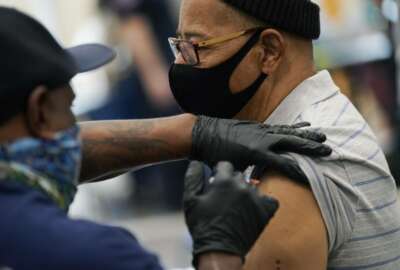

The Health Resources and Services Administration, part of Health and Human Services, wants to do something to combat "burnout" in health workers, in particular,...
Best listening experience is on Chrome, Firefox or Safari. Subscribe to Federal Drive’s daily audio interviews on Apple Podcasts or PodcastOne.
You’ve seen the footage for the past year and a half, hospitals and health clinics nearly overwhelmed by COVID patients. Nurses, doctors and their aides reaching the point of burnout. In some areas, these conditions are coming back. Now, the Health Resources and Services Administration, or HRSA, part of Health and Human Services, wants to do something about burnout in the health workforce, in particular, a grant program with more than $100 million. For details, Federal Drive with Tom Temin turned to the deputy associate administrator for Health Workforce at HRSA, Dr. Torey Mack.
Interview transcript:
Tom Temin: Dr. Mack, good to have you on.
Torey Mack: Great to be on Tom. The pandemic has had such a tremendous impact on the mental state of the health workforce. And the efforts we’re undertaking here at the Health Resources and Services Administration to combat burnout and ensure our workforce is able to deliver care is really needed now, more than ever.
Tom Temin: All right, and what’s your metric for knowing when a particular unit or hospital or area is having these mental health problems? I mean, it’s one thing to say so on TV, but you must have better measures than that.
Torey Mack: Absolutely. Even pre-pandemic, when we look back even to studies from 2019, depending on the discipline, 35-54% of nurses and physicians across the country were exhibiting substantial symptoms of burnout. And that was due to several factors, right? There’s high patient volumes, long work hours, workplace demand. So, this is not new. But unfortunately, COVID-19 has really turned this into a rising trend. So some of the things we look at when we talk about burnout is increased absenteeism, reduced productivity, you can see increased medical errors and safety lapses, more claims, and of course, high rates of turnover.
Tom Temin: Plus, it must be bad for the patients too to have to deal with people that are burned out and ready to choke the patient instead of helping them out.
Torey Mack: Yeah, you’re right. Empathy is one of the first things to go, right, in terms of how they’re able to provide that quality care. That’s why this is such needed support for our health care workers. And these stressors that I mentioned were already in existence, but when you add on a pandemic, you can just think about this. There’s uncertainty about the ultimate magnitude, how long is this going to last? The effects. Providers are concerned about how prepared their organizations are, how prepared the public is. Concern about are they going to have the right equipment, and just thinking about potential threats to their own health, right? And the contagion risk to their loved ones and their co workers. I’m a physician by training, and I worked both in primary care and specialty care. So I know firsthand what it’s like to really have that personal experience of being burnt out. And, of course, still have colleagues and friends who are struggling with this. So, it’s much needed and especially at this time.
Tom Temin: All right, so we need to do more than simply drop a couple of dozen doughnuts at the nurse’s station. You’ve got three programs for grants. Tell us about those.
Torey Mack: Absolutely. And you’re so right about that. The data shows us we can’t just solely focus on an individual right? A resilience of just one person. To face these challenges, we have to have a cohesive strategy as well. So it’s important but it’s not all of it. So an organizational culture of wellness is really needed to truly address burnout. And so I’m excited to say we have three funding opportunities. The American Rescue Plan has made available about $103 million in funding for three years. And so the first program we have is Promoting Resilience and Mental Health Among Health Professional Workforce. That’s fantastic, because this is really going to get at that organizational culture I was talking about. It’ll help organizations establish, enhance, or expand any evidence informed programs or protocols to really promote and implement organizational cultural wellness. And so that includes resilience as well as mental health among their employees. So that also includes that. The second program we have is actually thinking about trainees. So in the Bureau of Health Workforce, we have our education programs, our training programs, as well as connecting those into service to those areas that need them the most. And so, our second program is actually going to be up to 30 awards. And this is to go to educational institutions, and other state, local, tribal, public, or private nonprofits who are training those who are early in their health careers. And so this is going to, again, provide evidence informed, but this go around is going to be for planning, development, and training in health profession activities to reduce burnout, to prevent suicide, and to promote resiliency among the workforce. And our third program is actually a technical assistance center. It’s the Health and Public Safety Workforce Resiliency Technical Assistance Center. And this will be one award that will provide tailored training and technical assistance to these grantees of these programs, because we know they’re going to be able to learn from each other. This field, though there is a lot of data in terms of what to support providers with, it’ll be great for our grantees to be able to share that information and hopefully collate something that we can translate across the country.
Tom Temin: We’re speaking with Dr. Torey Mack. She is deputy associate administrator for health workforce at the Health Resources and Services Administration. And that was my next question really, because a certain limited number of organizations will get these grants and be able to develop these training and resiliency programs, but is there a way to spread it to all of the places because you never know where the next disaster might hit and overwhelm, say, a particular area and not necessarily the whole nation?
Torey Mack: Absolutely. And again, while the pandemic has certainly highlighted the need to focus on provider wellness, this is not something that’s just pandemic driven topic for us, we certainly have considered provider wellness to be an important piece of our work in terms of a well trained and ultra competent workforce. And so, for a number of years, we’ve integrated that into our grants language. It’s just really fortunate that we have this additional funding to focus on it. And you’re exactly right, we have to think about beyond our grantees, how is this going to be sustainable? So, really, that technical assistance center is going to be a key part of this overall effort to ensure that we are getting all of that information and we provide a way in which this can be disseminated across.
Tom Temin: And without giving away clues as to how to get a grant, do you have a general idea of what a resiliency program looks like that would be acceptable to HRSA as something to fund?
Torey Mack: Absolutely, we don’t want to be overly prescriptive, and we really want organizations to focus on their needs. What we’ve seen from the literature shows that really a concerted effort has to be based on the needs of your individual institution. So, whether that be looking at something like a call center, right, there are some supports as well in terms of consultations, referrals to mental health services and other support services as well to encourage professionals who are encountering these struggles in their personal professional life to seek help. But there’s also some unique strategies that you can consider that don’t necessarily have to do with that mental health as well. Whether that be some specific support your organization might need. Even thinking about things like child care. So, this funding, we really want organizations to be able to focus their efforts, and we want them to be able to really look at what they have available to support the frontline health workforce, and really looking forward to the applications to come in.
Tom Temin: And I’m curious as to whether say, the Defense Health System or the Veterans of Health Administration, have they got programs that might be models? Because obviously, they can’t get federal grants from HRSA, but they are large health care delivering organizations that, from time to time, do get stressed. Do they have programs that could be modeled?
Torey Mack: They do. They do. There’s programs across the country. We can learn a lot from our federal partners in terms of what they’ve been able to really accomplish. And we can also learn a lot from our academic health centers and our health workforce research centers who’ve really delved into this quite a bit. There are a lot of studies that are looking at this, and I think there’s a lot that organizations can pull from. And I really think that they can really learn from each other as well.
Tom Temin: And just give us the timelines and deadlines and so forth for this particular three part program that we’ve just been describing.
Torey Mack: Absolutely. To apply for these provider resiliency workforce training programs, you can visit grants.gov. And the applications are due Aug. 30 of this year.
Tom Temin: All right. Dr. Torey Mack is deputy associate administrator for Health Workforce at the HRSA — Health Resources and Services Administration. Thanks so much for joining me.
Torey Mack: Thank you so much for having me Tom.
Copyright © 2025 Federal News Network. All rights reserved. This website is not intended for users located within the European Economic Area.
Tom Temin is host of the Federal Drive and has been providing insight on federal technology and management issues for more than 30 years.
Follow @tteminWFED


